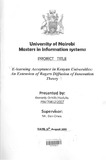| dc.description.abstract | This study investigates the factors that influence the acceptance and adoption of asynchronous e-learning
systems in Kenyan universities and presents a conceptual model based on Rogers‟s diffusion of
innovation theory.
The Model was tested with questionnaire Instruments to a sample size of 639 respondents from 4 public
universities. The respondents included e-learning students (N=241), non e-learning students (N=344), elearning
lecturers (N=33) and e-learning technicians (N=21).
The results proved that for all the respondents, e-learning awareness and its benefits were the most
important factors to influence adoption.
Content quality, instructor influence, e-learning and computer training plus other technology use formed
the other adoption factors for e-learning students while internet access, instructor and fellow student
influence were instrumental for adoption by non e-learning students.
The e-learning instructors showed that, training, institutional support, rewards, incentives and recognition
influenced their adoption while other factors like training, other technology use, e-learning benefits and
triability were also crucial.
The most important factors for the e-learning technicians were training, triability, rewards and recognition
and institutional support. | en |

